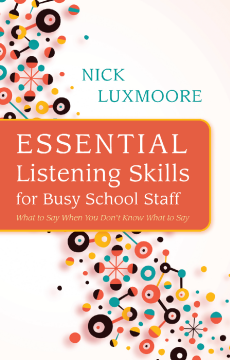
Additional Information
Book Details
Abstract
How do you listen effectively when you're already late for a meeting? How do you respond to a girl who's so angry that she's threatening to hit someone? Or to a boy who feels like giving up altogether? How do you listen, not only to students, but also to parents and to colleagues?
Whatever your role in school, listening will be at the heart of what you do. Your school will be measured, in part, by the quality of its daily relationships and those relationships will depend on how confidently people are able to listen to each other. This book answers all the difficult questions about how to listen, what to say, confidentiality and more. Helping with particular issues such as bullying, relationship difficulties, depression and self-harm is also covered.
With over 35 years' experience in a variety of school roles, Nick Luxmoore offers practical, realistic answers, advice and guidance. This book will be essential reading for teachers and non-teachers alike.
Nick Luxmoore is a school counsellor, trainer, teacher, youth worker and UKCP registered Psychodrama psychotherapist. He has over 35 years' experience of work with young people and with the professionals who support them. He is the author of several books published by Jessica Kingsley Publishers, including School Counsellors Working with Young People and Staff: A Whole-School Approach, Working with Anger and Young People and Feeling Like Crap: Young People and the Meaning of Self-Esteem. He currently works as the Counsellor at King Alfred's Academy, Wantage, UK.
Nick Luxmoore has a deep understanding of schools and the young people and adults who inhabit them. Starting from the assumption that we all like to think we listen to each other, this short, accessible book explains how, where there is a genuine will, this can become a reality. By removing the mystique from 'counselling' and providing lots of practical examples, it shows how relatively simply schools can become communities in which all the people really do make time for each other - not just because it's the right thing to do, but also because it makes them more effective places. This book should be required reading for all those adults who work with young people and their families... and most importantly, for school leaders who want to make sure that the words fit the music.
Bernard Clarke, formerly Headteacher in Oxfordshire schools and Advisory Headteacher in Kent.
